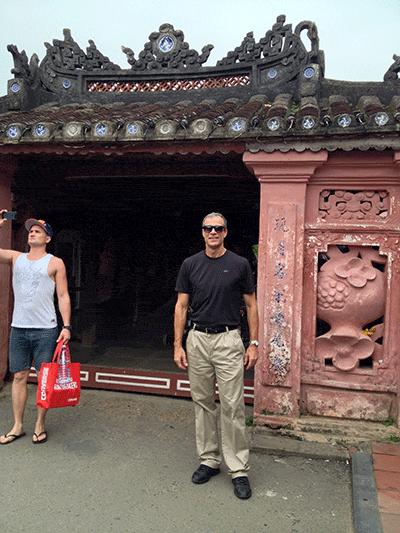AHA members are involved in all fields of history, with wide-ranging specializations, interests, and areas of employment. To recognize our talented and eclectic membership, AHA Today features a regular AHA Member Spotlight series.
Jon Davidann is a professor of history at Hawaii Pacific University. He currently lives in Kailua, Hawaii, and has been a member of the AHA since 1993.
Fields of interest: US-Japanese relations, world/global history
When did you first develop an interest in history?
When I was 10 years old, my mother gave me a pictorial history of the American Civil War as a Christmas present. That pretty much sealed it.
What projects are you working on currently?
I am writing on US and East Asian concepts of modernity in the 20th century. I have finished two chapters and I am dipping back into the theoretical literature now that I have a little better idea of what the project is about. The University of California Press has expressed interest in publishing it as a book.
Have your interests changed since graduate school? If so, how?
I wrote my dissertation, which became my first book on American YMCA missionaries and Japanese Christians in Japan. At that point, I was concerned that I would be button-holed as a missionary historian and this was back in the 1990s when missionary history was at its nadir. Since then missionary history has reemerged somewhat from obscurity. So I decided to broaden my approach by looking at more general cultural evidence of the relationship such as public opinion, NGOs, and private citizen activities. I also became a regular at the SHAFR conferences and this pushed me towards diplomacy. At the same time SHAFR became more open to cultural approaches, which confirmed my methodology. So my second monograph used cultural diplomacy as the framework to look at the breakdown of US-Japanese relations in the 1930s. Now I am writing an intellectual history of US-East Asian relations which is closest to my training in graduate school. So yes, change is absolutely essential to staying relevant in our field.
Is there an article, book, movie, blog etc. that you could recommend to fellow AHA members?
There are so many books to recommend. I am very catholic in how I read. I think we can learn a great deal from books outside our specialties. I am reading Rana Mitter’s Forgotten Ally which is an excellent book in my field but I am also starting David Abulafia’s The Great Sea which focuses on the Mediterranean, about as far from my field as can be. And the new books on World War I, Sleepwalkers by Christopher Clark, Catastrophe 1914 by Max Hastings, and The War That Ended Peace by Margaret McMillan, have been great fun to read. Clark gets my vote.
What do you value most about the history profession?
The fierce independence of historians and methodological minimalism of the historical profession means that when we research, write, and interpret events from the past, we are acting a little bit like gods and there is great power in that. My wife who has absolutely no interest in my profession keeps my feet on the ground.
Why did you join the AHA?
I joined the AHA in the first instance because I was on the job market and had to attend AHA conferences to do interviews. But I have kept my membership current because I think the AHA can serve the interests of historians, especially academic historians, better than we can by ourselves. There are lots of threats to the historical profession in academia right now and we need to stick together to make sure history is protected and nurtured.
Other than history, what are you passionate about?
Reading, bicycling, travel, good music, good food.
Any final thoughts?
The AHA needs to be strategic in the current environment, which poses so many dangers. Outgoing president Ken Pomeranz has done a good job of beginning to shift our focus and the organization needs to continue to evolve to find ways to strengthen our undergraduate curriculum, fight to keep our place in general education, and train our PhD students for a variety of fields, not just academics. Let’s be ambitious and stay vigilant. The next set of challenges is just around the corner.
This post first appeared on AHA Today.
This work is licensed under a Creative Commons Attribution-NonCommercial-NoDerivatives 4.0 International License. Attribution must provide author name, article title, Perspectives on History, date of publication, and a link to this page. This license applies only to the article, not to text or images used here by permission.


